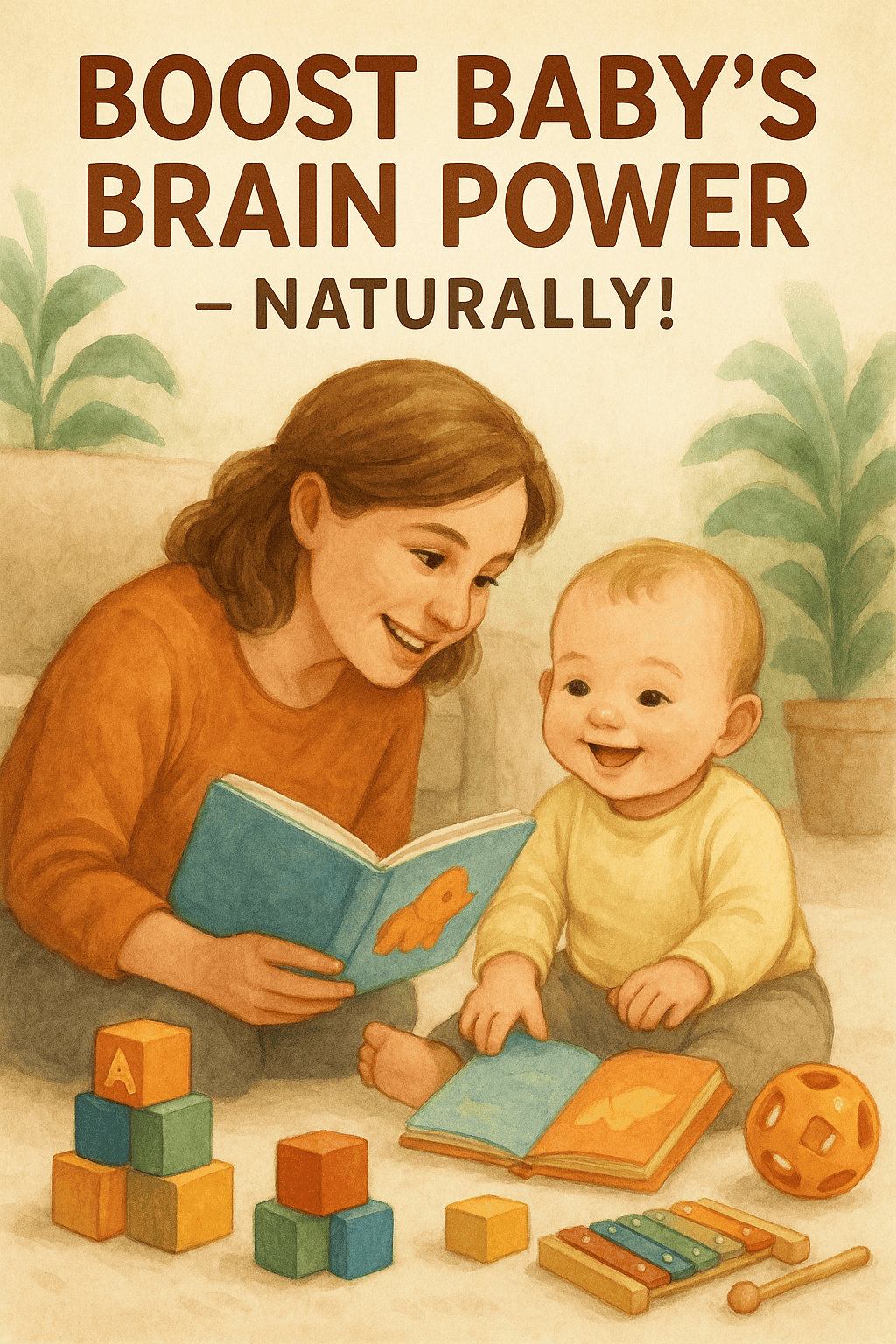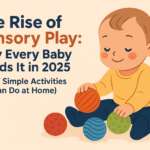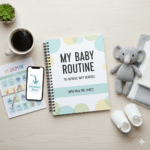Introduction
Your baby’s brain is growing at an incredible rate during the first two years of life. Did you know that by the age of 2, a baby’s brain is already 80% the size of an adult brain? These early years are critical for building a strong foundation for future learning, memory, behavior, and emotional development.
As a parent, you might wonder: How can I help my baby’s brain grow smarter, stronger, and healthier — naturally? The good news is, many simple and natural practices can significantly enhance your child’s brain development.
In this blog, we’ll explore 10 expert-backed, science-supported, and easy-to-follow tips that you can start implementing today. From nutrition and sleep to play and love, everything you do matters.
Let’s unlock your baby’s brain potential — naturally!
1. Responsive Talking and Bonding
Talking to your baby is one of the most powerful tools for brain development. Even if your baby can’t speak yet, their brain is absorbing every sound, tone, and expression.
What to Do:
- Talk to your baby during daily activities (feeding, bathing, changing diapers)
- Use a loving tone and simple words
- Describe what you’re doing and seeing
- Make eye contact and smile
Why It Works:
This builds language pathways and emotional security. Babies who hear more words develop stronger vocabularies and social skills later in life.
Pro Tip: Start using your native language as well as basic English/Hindi words. It stimulates bilingual brain development.
2. Breastfeeding and Brain-Fueling Nutrition
Nutrition plays a vital role in brain development, especially during the early years.
What to Do:
- Breastfeed for at least 6 months, if possible (rich in DHA and ARA for brain growth)
- Introduce brain-boosting solids like:
- Eggs (rich in choline)
- Bananas
- Avocados (healthy fats)
- Leafy greens
- Whole grains
Why It Works:
Essential fatty acids and key nutrients like iron, zinc, and choline help build brain cells and connections.
Tool Tip: Track your baby’s meals with our Baby Food Recipe
3. Tummy Time and Movement
Physical movement is directly connected to brain wiring. Tummy time strengthens muscles and stimulates brain development.
What to Do:
- Start tummy time from newborn stage (supervised)
- Gradually increase time daily
- Place toys or mirrors to encourage movement
Why It Works:
Helps develop coordination, spatial awareness, and motor skills which are linked to cognitive development.
Bonus: Crawling, standing, and walking all activate different brain zones.
4. Sensory Stimulation through Play
Babies learn through their senses: touch, sight, hearing, taste, and smell.
What to Do:
- Offer textured toys, rattles, musical instruments
- Let them explore safe objects
- Sensory boxes with rice, pasta, soft fabrics
- Water play and sand tubs
Why It Works:
Stimulates different parts of the brain and encourages problem-solving and curiosity.
Try Now: Check our Baby Play Planner
5. Read Aloud Daily
Books are brain boosters! Reading stimulates language, imagination, and emotional bonding.
What to Do:
- Start reading from birth
- Use picture books with bright colors
- Point at objects and say their names
- Make sounds and gestures
Why It Works:
Reading aloud forms strong language foundations and improves attention span.
Stat: Children who are read to daily have 1.4 million more words heard by kindergarten.
6. Music, Rhythm, and Singing
Music is magic for the brain – it helps with memory, math skills, and emotional balance.
What to Do:
- Play classical, lullaby, or baby-friendly music
- Clap, tap, and move with the beat
- Sing nursery rhymes
Why It Works:
Activates multiple brain areas – auditory, motor, and emotional centers – all at once.
Pro Tip: Combine music with movement for double brain benefit.
7. Unstructured Play and Exploration
Give your child time to play freely. Let them explore at their own pace.
What to Do:
- Provide open-ended toys (blocks, stacking cups, balls)
- Allow safe floor time
- Avoid screens under age 2
Why It Works:
Unstructured play builds creativity, decision-making, and emotional regulation.
Tool: Set daily routines with balanced play using our Routine Generator
8. Adequate Sleep and Brain Rest
During sleep, your baby’s brain processes all the learning from the day.
What to Do:
- Ensure 11–14 hours of total sleep per day
- Maintain a consistent bedtime routine
- Avoid screen exposure before sleep
Why It Works:
Sleep boosts memory consolidation, emotional balance, and cognitive growth.
Use Now: Try our Baby Sleep Tracker to monitor naps and bedtime
9. Emotional Security and Love
A loving and stress-free environment is the soil in which your baby’s brain flourishes.
What to Do:
- Cuddle often
- Respond to your baby’s cries and signals
- Smile and maintain eye contact
Why It Works:
Secure attachment builds the foundation for lifelong learning and mental health.
Remember: A calm parent = a calm brain for the baby.
10. Multisensory and Bilingual Exposure
Introducing your baby to more than one language or sensory input can stimulate higher brain activity.
What to Do:
- Speak in two languages casually
- Let them hear different sounds, music, and rhythms
- Show them objects and name them in both languages
Why It Works:
Bilingual babies develop better memory, attention, and problem-solving skills.
Fun Tip: Label household items in two languages as a daily game.
Bonus Section: Mistakes to Avoid
- Too much screen time: delays speech and social skills
- Lack of sleep: leads to irritability and slow learning
- Over-scheduling: babies need downtime too
- Ignoring emotional needs: bonding is essential for growth
Final Thoughts
You don’t need expensive toys or classes to raise a smart baby. What matters most is your time, love, and mindful attention. These simple, natural habits make a powerful impact on your child’s brain.
Start slow. Be consistent. Observe what your baby loves. Each moment is a chance to build their future.
And to make it easier
Have questions or baby-care doubts? Ask our AI-powered Baby Chatbot now on MyBabyRoutine.com





